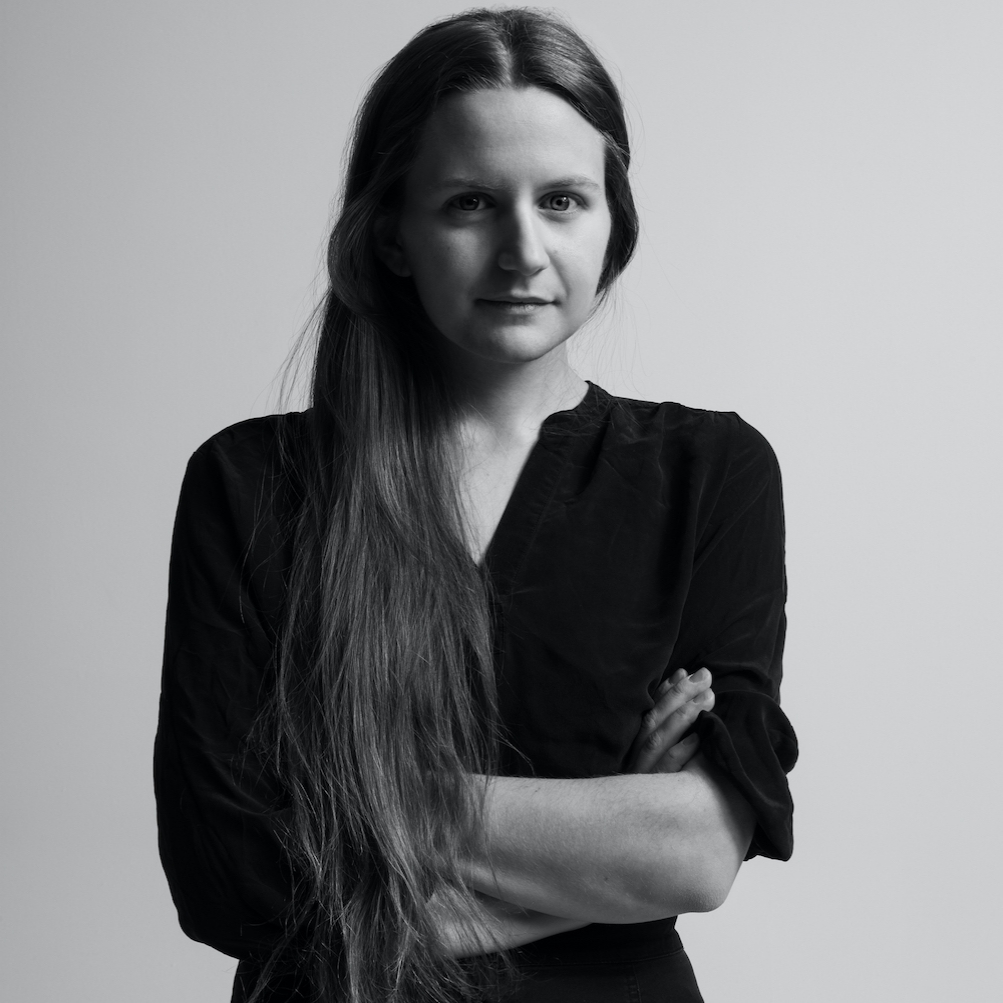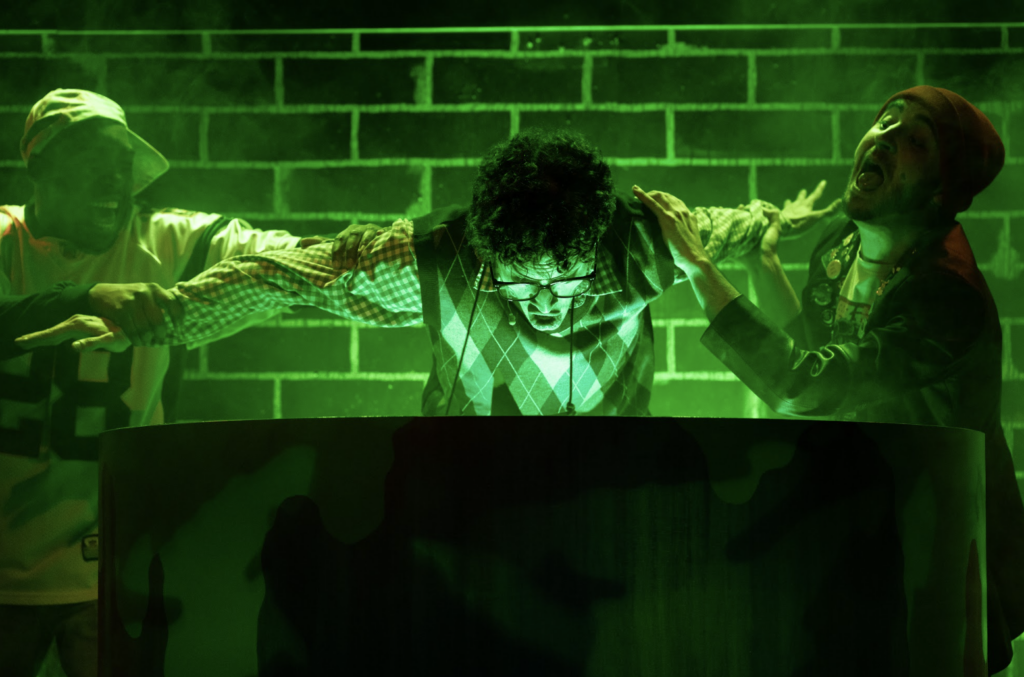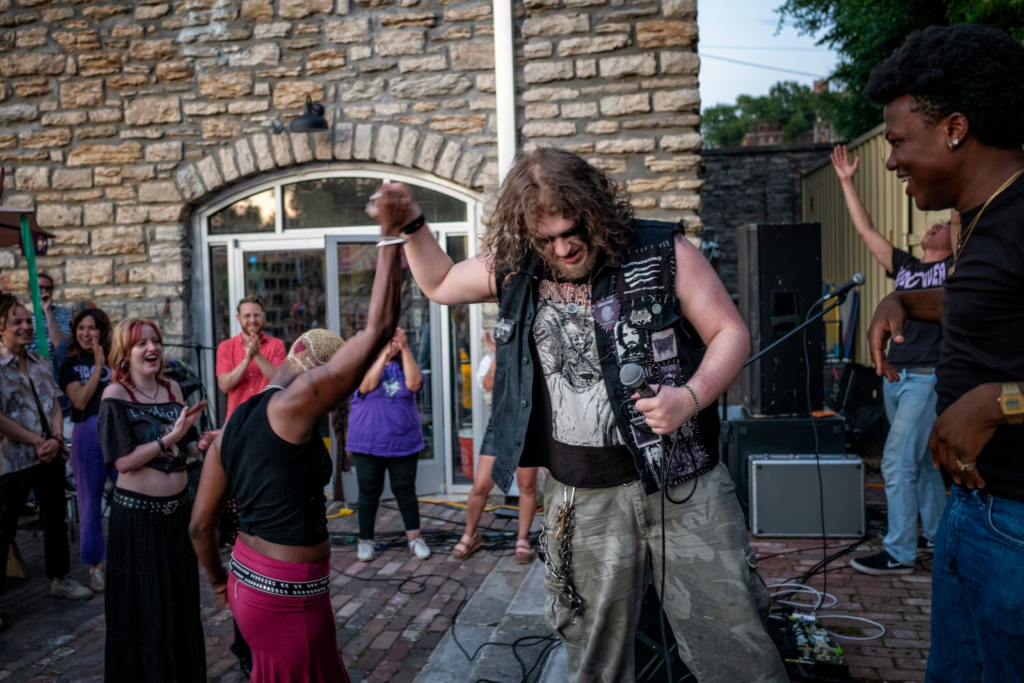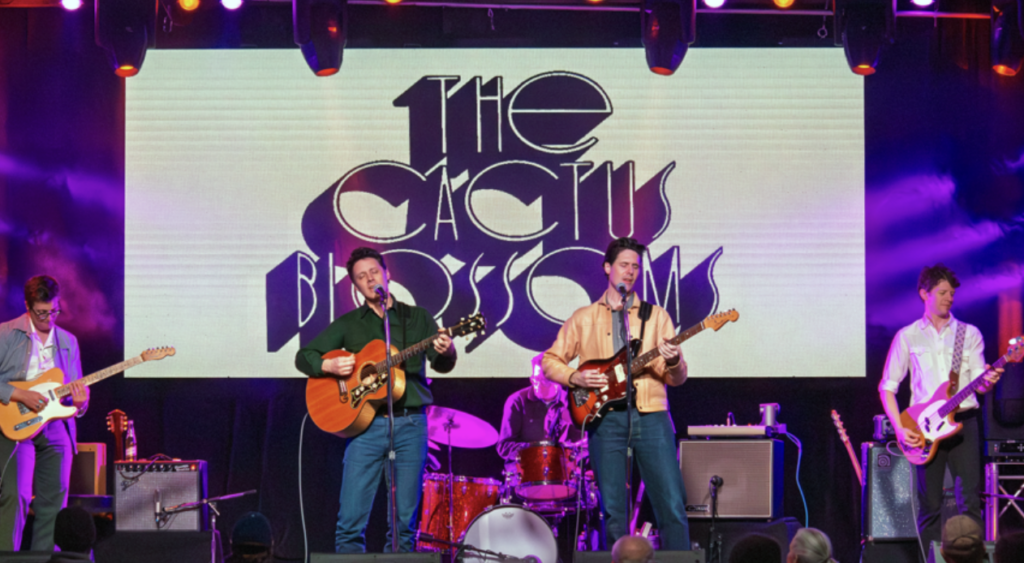Journalist Liz Pelly visits local libraries to deep-dive her book Mood Machine and the ‘costs’ of Spotify
On Tuesday, May 13, Mid-Continent Public Library will host journalist and author Liz Pelly to discuss her new book, Mood Machine: The Rise of Spotify and the Costs of the Perfect Playlist as part of their “Facing the Future” series. The following evening, Wednesday, May 14, she will speak at the Lawrence Public Library in a conversation entitled “Is Spotify Ruining Music?” presented by LAAND and the Lawrence Music Alliance.
Pelly’s book is an “unsparing investigation into Spotify’s origins and influence on music, weaving unprecedented reporting with incisive cultural criticism, illuminating how streaming is reshaping music for listeners and artists alike,” drawn from over 100 interviews with “industry insiders, former Spotify employees, and musicians.”
It’s a fascinating read, and we highly recommend checking out an excerpt of the book at Harper’s entitled “The Ghosts in the Machine” to get excited for these two events. Ahead of her area appearances, we hopped on Zoom with Liz Pelly to discuss Mood Machine and all things Spotify.
 The Pitch: It seems as though you have been working on this story for a very, very long time, and every question that you answered seemed to raise other questions. How do you know when you have answered all of the pertinent questions?
The Pitch: It seems as though you have been working on this story for a very, very long time, and every question that you answered seemed to raise other questions. How do you know when you have answered all of the pertinent questions?
Liz Pelly: I don’t think that the book does answer every question that I have about this story. In some ways, I think of the book as part of a longer ongoing reporting project that didn’t necessarily start with the book and doesn’t necessarily end with the book, either, but I do think that it felt helpful and meaningful to compile as much as I could into a 90,000 word book that people could potentially use as a resource or have as a foundation
There’s been an ongoing discourse around the impact of streaming on music for over a decade now, and one of the interesting challenges of writing a book like this is writing something that is general and accessible enough to hopefully be a really good resource for someone who’s coming to the conversation for the first time and maybe has never thought of some of the impacts that streaming has had on music before or maybe has thought about it, but hasn’t really grappled with the literature or read the articles.
Also, to write something that makes a significant enough contribution that people who have been following the conversation for a decade plus feel like they’ve learned something from it, as well, or to be able to help illuminate new corners of the impact of streaming on music for people who are really plugged into these issues.
I assumed a book about Spotify and the music industry would be about payouts and how artists only get pennies at times, but the whole idea of this ghost musician ecosystem was the thing that really grabbed me. That there are musicians working in anonymity to create music, where Spotify is essentially contracting people to make music for their service, because it’s cheaper than paying other folks? It’s a wild concept when I say it out loud. However, library music companies have existed for decades–well over half a century at this point, with labels like KPM and DeWolfe. What are the very specific differences between a library music company and what these companies are doing with ghost artists?
I think one issue is the lack of transparency around what’s going on. Ever since I wrote this book, I’ve had a lot of people reach out to me. Just yesterday I had someone else send me an email–a link to something they found on Spotify saying, “Hey, me and my friends have been looking at this artist profile, trying to figure out whether generative AI makes this or if this is a ghost artist, or if this is a real musician. Do you know? This can’t be real.”
I look at it and I’m like, “Yeah, it seems like this is a person who maybe is making music under a pseudonym. It doesn’t seem like they’re on any official Spotify playlist. I don’t think it’s generated AI, but it does seem like it’s someone who made a profile specifically for the purposes of trying to crank out background music and get it on these lean-back playlists.” People have all this confusion because you have music that’s made for all of these different purposes and it’s all existing within the same ecosystem.
One thing that I think is a really easy to agree on, tangible takeaway from this reporting is that material that is on streaming services that is operating under either under special commercial circumstances or special commercial terms or if it’s music made with generative AI, it should be labeled so that people don’t have these questions.
Another way that I like to sort of frame it that has been helpful for me is thinking about what makes this different from a previous era of library music or production music. Like you said, it’s historically been the kind of not unusual day job for someone who is a musician to also make music for an advertising company or a production library.
I think what’s happening currently on streaming services is a form of what media critics will call context collapse. In the platform economy, you have all of these different contexts that people might exist within or something you’re posting might exist within and all the different contexts have all been flattened out and collapsed into one platform.
It makes it unclear what audience you’re posting something for or what audience you’re trying to reach when you share something, because all of these different contexts have blurred into one platform. Historically, when someone made production music or made library music, it was for a specific context. It existed within a specific economic arrangement or for a specific purpose, and now you have all this music that’s made for all of these different purposes under all of these different commercial arrangements all being thrown on the same platform.
Then you have Spotify executives saying, “Oh no, this is all art. These musicians are just like any other artists. They’re just like choosing to have a different financial relationship with their art,” and there’s nothing wrong with having a day job making production music. It’s a totally normal job for musicians to have. There’s a purpose that production music fills, especially when it comes to its use in media and film and advertisements, but to suggest that all of this work is the same, is such a disservice to the people who make all of this music for all these different reasons.
Spotify, when it launches, is billed as being that you have access to the sum total of the world’s recorded music, up to a point. You can discover new music through these playlists and there’s a way to delve deeper. Then, what has come out of this ecosystem is essentially the thing that’s blown my mind about the rise of streaming music–it’s essentially music you ignore. It’s this entire genre of music that you put on and don’t pay attention to, which is vaguely nihilistic, at least in terms of how I approach music. The idea that you are specifically seeking out music that does not engage you, I have to imagine, is mildly soul-crushing for these artists who are recording all of this music to study and sleep to.
That was something that definitely came up in some of the interviews. especially for musicians who are more caught in the middle. They make instrumental music, but maybe they don’t necessarily fully think of what they do as background music. The music that they make has been recast or reimagined in the streaming era and recontextualized into these lean-back playlists.
I feel like, for some musicians, it seemed to be something that they really struggled with, this idea that in the streaming era they could maybe reach a large audience with their music. Many people are streaming their music through these background playlists, but it wasn’t translating into actual fandom or people even like connecting with their art in any way. That’s definitely like an interesting dilemma for some musicians.
I interviewed quite a few anonymous musicians who had made music for these production companies that are contracted by Spotify to make certain music for these playlists an a bunch of them just talked about how boring it was to be commissioned to make this work and talked about how the goal is to play as simply as possible. Nothing that could be challenging or distracting and I think one of them called it “completely joyless.”
When you give these talks, like you do here in Lawrence and in Kansas City, what do the audience interactions end up being? How many musicians are in the audience wanting to tell you the stories of their experiences with this?
Something that has been surprising to me is how many musicians who have been personally impacted by the ghost artist phenomenon, their music having been removed from popular Spotify playlists those types of folks. When I wrote the book. I was thinking about a type of musician who I thought would be really interested in this story. I was thinking maybe people who are coming from more of like a like independent music or DIY or punk background–musical traditions that are skeptical of the culture industry–but it’s been an interesting surprise to also be meeting people from all corners of music.
Even musicians who do really well in the streaming era have their own critiques of the direction that music is going in or the different pressures that they feel, in addition to some musicians who are more wrapped up in these lean-back, instrumental musical traditions that have been impacted. Even hearing from some musicians who are more in the pop sphere and stuff has been super interesting.
I think there are some musicians who, for a long time, have felt this resignation, like this is just the way things are and there’s nothing we could do about it. For those types of musicians, maybe it has been interesting to see an attempt to challenge that idea.
https://www.youtube.com/watch?v=0J_QpGChf4I
What other stuff are you working on at the moment that you can talk about?
Well, probably the most tangible thing so far is that I did start a podcast that grew out of my book launch event. The person that I was in conversation with for my book launch event in New York City, it was a really good conversation and after it, a bunch of people were like, “You guys should start a podcast. That was great,” so we just ran with it and someone offered to produce it. It’s called Critical Listening, and it’s gonna be critical conversations around music and technology.
Liz Pelly will be at Mid-Continent Public Library’s The Auditorium at Woodneath Library Center on Tuesday, May 13, as part of their “Facing the Future” series and the following evening, Wednesday, May 14, she will speak at the Lawrence Public Library in a conversation entitled “Is Spotify Ruining Music?” presented by LAAND and the Lawrence Music Alliance.





